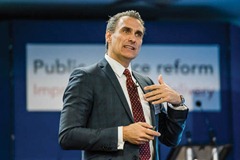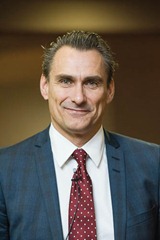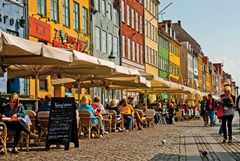Digital public services
 Thomas Jakobsen, Copenhagen’s Chief Operating Officer for Culture and Leisure Administration, explains to eolas how the city has completely redeveloped public services through digitalisation.
Thomas Jakobsen, Copenhagen’s Chief Operating Officer for Culture and Leisure Administration, explains to eolas how the city has completely redeveloped public services through digitalisation.
Speaking to Thomas Jakobsen, it’s hard not to get caught up in his infectious enthusiasm. Jakobsen is immensely proud of his home city Copenhagen and how it has transformed contact between the city and its citizens through digitalisation.
Digitalising the city has had a huge impact on the lives of its inhabitants. They have been provided with a NemID card with their own personal identification number. This enables citizens to access most services online, from renewing their passport to ordering a wedding licence. It is now mandatory to carry out all such tasks online, which works well due to 95 per cent of the population having internet access.
The total investment to get the digital scheme up-and-running was €30 million but with annual savings equating to €20 million, by year two the city was already turning over a profit. Since 2010, staffing levels have been reduced by 20 per cent: 10 per cent through retirement and 10 per cent through redundancy.
Change
“Change is, of course, difficult when there’s people involved but it’s getting better by involving the citizens,” he remarks. “We need managers who want to change themselves and if they don’t want to do that, they shouldn’t have become a manager and they will be removed. We do this very efficiently. We want our managers to take risks, try new ideas.”
Another alternative incentive available to city centre managers is the promise of a plum bonus, provided they’ve made a mistake during the course of the year.
Jakobsen is a great supporter of this as he believes mistakes can only be made by trying something completely different and, as innovation and creativity are at the heart of the Copenhagen ethos, the bigger the mistake, the better in his view.
“Looking at the problems we had, it’s much to do with the culture and for both the managers and the employees to see that they have to make those changes,” he comments. “People are uncomfortable with making changes so you have to make them a normal part of your culture in the workplace.”
Partnership
Another thing the city learnt to do was to use its citizens and partners, something Jakobsen feels is much to do with trust. This is seen very much as a value, trusting the employees that they can be innovative and create new ideas. This, in turn, makes it easier for them to test those ideas out. Trusting the citizens and using volunteers means they want to do much more for their city.
Some people see this happening and fear that they will lose their job. However, when people see that they are gaining from these new services then it becomes a great idea.
 Copenhagen regularly tops polls in terms of the happiest citizens and Jakobsen believes that a great deal of this is down to the locals being given a lot more ownership of their lives. With the majority of public services moving online, facilities are available around the clock enabling locals to do their own personal admin at times most suitable to them.
Copenhagen regularly tops polls in terms of the happiest citizens and Jakobsen believes that a great deal of this is down to the locals being given a lot more ownership of their lives. With the majority of public services moving online, facilities are available around the clock enabling locals to do their own personal admin at times most suitable to them.
Entrusting citizens to manage their lives much more has had another positive effect as more people are now choosing to give something back to society and volunteering.
A key element of Copenhagen’s success is due to trusting its citizens to make the changes. Jakobsen states: “We have been using a lot of volunteer work to deliver our services, in particular getting students to come and help us develop our services and teach others how to avail of them.”
He believes that rather than emphasising efficiency as the value, reform can be very much about life quality. It is one thing digitalising all administrative services but by actually using technology in key services such as healthcare and education, several goals in those areas can also be achieved.
For the last five years, Jakobsen has been in charge of the citizen service centre. The centre is the first line of all channels of communication with the citizens. “I have been responsible for the web page and the online services. It also means I have responsibility for all telephone contact with the citizens and also when they have to come in to get things sorted,” Jakobsen explains.
Unlike in Ireland, Danish local authorities have a lot of power. They can produce passports, driving licences and health insurance certificates, register addresses and personal identities, process taxes and retirement benefits, and carry out wedding registrations for locals and foreign visitors.
Ninety-five per cent of the Danish population has high speed access to the internet and 91 per cent of all Danes now receive all their communication from the local authority in a national digital mailbox. There is generally no longer a need to send letters as over 50 services can be carried out online.
Three years ago changes were also made to how citizens apply for social and retirement benefits, making it mandatory to apply online. Immediately, there was a 70 per cent uptake of that because people wanted to get their money.
Denmark has also issued a citizen card. When residents go online they use a personal code and their social security number printed on these cards. Five years ago, all the banks and the Government made an agreement that when residents went online, the use of the card would be compulsory.
Jakobsen states: “We also had a national strategy five years ago saying that citizens had to go online for all communications and use [their] national mailbox: 35 self-service, manage your own solutions, for example applying for university, high school, pension and benefits.”
Efficiency
Efficiency and cost-cutting are at the centre of all improvements. One of the key things Copenhagen looked at five years ago was the price of the various forms of communicating. Through this it was noted that using online services is much cheaper as opposed to writing letters. Using the phone is another slightly more viable method of communication. There’s now a very professional call centre with 120 employees. “We aim to answer every call within 25 seconds and the people are very happy with this service,” Jakobsen adds. He believes when it comes to the digitalisation process and subsequent reorganisation it is important to work together with different agencies: “It’s much easier and will be much more efficient.”
 But what happens to the small percentage of citizens who aren’t digitalised? A special strategy has been developed to cater for them with an intensive focus on meeting their needs because in most cases they are never going to be digitalised. As part of the ongoing investment and development, social media activity has been increased with Facebook, Instagram and Twitter as new, informal ways to communicate with the citizens. This has received a good response.
But what happens to the small percentage of citizens who aren’t digitalised? A special strategy has been developed to cater for them with an intensive focus on meeting their needs because in most cases they are never going to be digitalised. As part of the ongoing investment and development, social media activity has been increased with Facebook, Instagram and Twitter as new, informal ways to communicate with the citizens. This has received a good response.
“We use these to provide different kinds of information as well as teaching people how to use our digital services. People are now starting to communicate with the city through these methods as they see them as a friend and as a partner,” Jakobsen explains.
Education
So far, more than 1,000 digital ambassadors have been trained to help teach others how to fully utilise the online services. Libraries and unique citizen service satellite boxes are at the heart of educating both locals and visitors.
Using the digital libraries, citizens can be educated on how to use those online services. The city is constantly seeking new ways of engaging and educating the public. One such example is an interactive box in Copenhagen’s central train station with a touch screen which connects directly via videolink, to the city’s call centre. This offers a wide range of services whether you are a local or a tourist and the council plans to locate boxes like this throughout the city. Jakobsen believes it provides a better kind of service because looking into people’s eyes and not just talking to them on a phone is much more personal.
Looking ahead to the future of Copenhagen, Jakobsen says: “Our next stage is about looking at how we can become an even smarter, more sustainable city. We will become even more digital.”
“My recommendations to Ireland would include have a national strategy,” he comments.
On an urban note, Jakobsen concludes: “Local leadership is important, focus on new ways to deliver services and, of course, innovation is key. Look at ways to deliver all services at less price, becoming an even more digital and smarter





